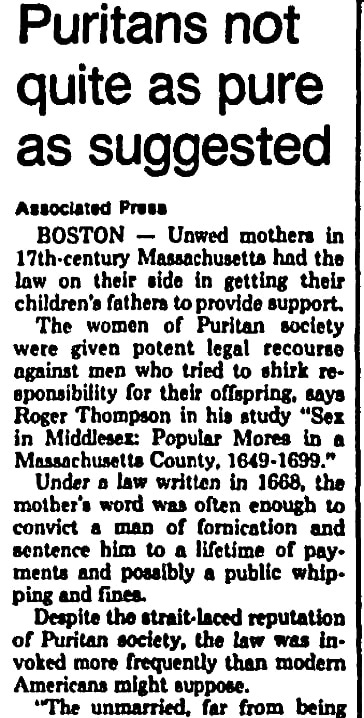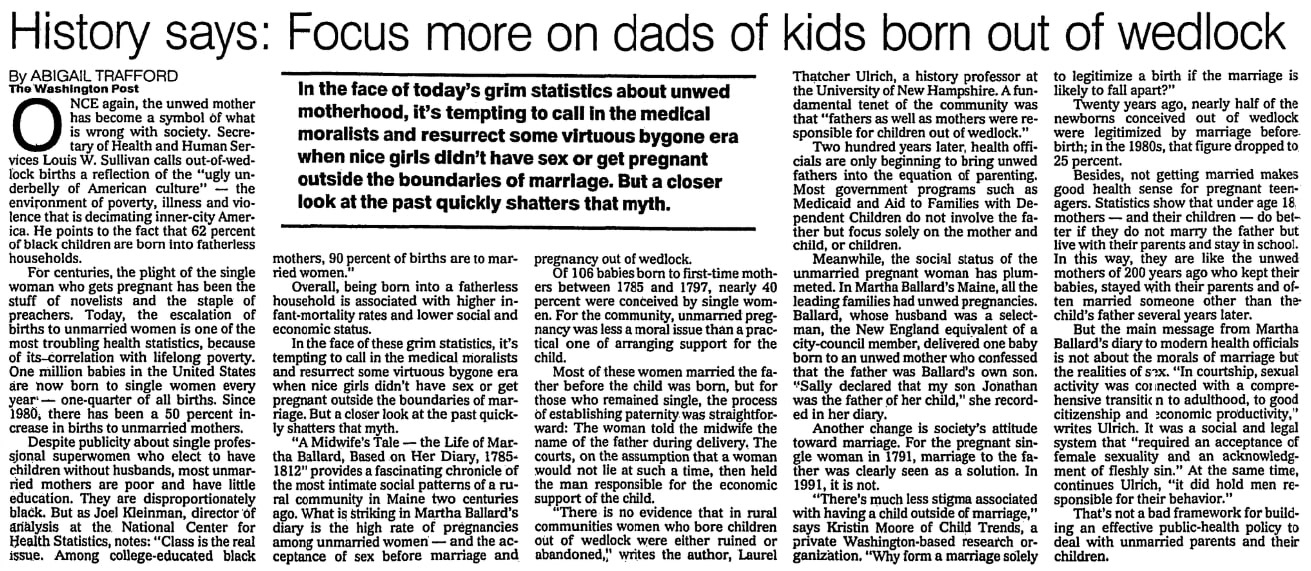Introduction: In this article, Melissa Davenport Berry writes about out-of-wedlock births in some of the earliest colonial settlements in America. Melissa is a genealogist who has a blog, AnceStory Archives, and a Facebook group, New England Family Genealogy and History.
I promised you more paternity drama and today I bring it on. These paternity cases involve the early generations that settled Amesbury and Salisbury, Massachusetts. (If you missed the previous articles, you can find their links at the end of this article.)
To recap: The court records of early America are filled with cases of fornication, and they came in all types. Our subjects in today’s story were all from Massachusetts and single at the time of the charges.
The women were pregnant, and the law was on their side. To ferret out the identity of the daddy, the Massachusetts courts relied on the word of the expectant mother – as noted in this Las Vegas Review-Journal news clip.

This article reported:
Under a law written in 1668, the mother’s word was often enough to convict a man of fornication and sentence him to a lifetime of payments and possibly a public whipping and fines.
…Puritan society, wishing to ensure that the community would not have to pay for an illegitimate child’s upbringing and that the sinful parents repented, was anxious to identify the father as well as the expectant mother.
This article also explained the role of the midwife:
Under the law, midwives became inquisitors who would refuse to help a woman in labor unless she named the father.
The law did not always work as intended, [professor and historian] Thompson writes.
Susannah Coburn told her midwife in 1696 that “I must perish for I do not know” who the father is. She later testified that she was afraid to name the baby’s father, who was the son of her midwife.
Historian Laura Thatcher Ulrich has published several good reads about women’s role in early New England, specifically the midwife.
In an article from the Flint Journal where Thatcher is featured on the issue of unwed mothers, she asserts that in early colonial society “fathers as well as mothers were responsible for children [born] out of wedlock.”

This article reported:
…For the community, unmarried pregnancy was less a moral issue than a practical one of arranging support for the child.
Most of these women married the father before the child was born, but for those who remained single, the process of establishing paternity was straightforward: the woman told the midwife the name of the father during delivery. The courts, on the assumption that a woman would not lie at such a time, then held the man responsible for the economic support of the child.
In 1712 Joseph Quinby, a single man of Amesbury, Massachusetts, fathered two illegitimate children with two different women.
A few years later Quinby was back in court facing double trouble: he fathered twin babes in 1715 with one of the mothers from the first round.
Thanks to the amazing research of Melinde Lutz Sanborn, who compiled a translation of court records spanning over 50 years in her book Lost Babes: Fornication Abstracts from Court Records, Essex County, Massachusetts, 1692-1745, I was able to locate the original court documents in the Quinby cases, and the midwife testified in all three cases: Joseph was named the father.
Sanborn’s “Lost Babes” really uncovers buried roots in the New England family trees!
Note: various spellings of surnames were used in the documents referenced below, and Joseph Quinby was known as Joseph Jr., because his Uncle Joseph did not want anyone to confuse them.
To begin: Joseph Quinby was born in Amesbury and his birth date and parents are identified in the Records and Files of the Quarterly Courts of Essex County Volume IX.
The apple does not fall far from the tree. Joseph’s birth came too quickly after his folks tied the knot. This was a sure sign to officials, as well as the church, that the couple were guilty of carnal relations prior to marriage. It was all the evidence needed to bring the couple before the grand jury.
Robert Quinby was married to Mary Jons [Jones] on 20 March 1684. Joseph Quinby, their son, was born on 21 June 1684. Attested by Richard Currier, recorder. Charged on 20 June 1684: Robert Quinby and his wife Mary for fornication. (p. 335)
Years later, it was the son’s turn. Joseph Quinby carried on relationships with Rachel Morrill and Lydia Hoyt simultaneously.
Rachel was the daughter of Moses Morrill and Rebecca Barnes, and granddaughter of Salisbury’s early settler Abraham Morrill.
She had one daughter, Johanna Quinby, born in 1712. Three years later, she had twin boys, Joseph and Benjamin Quinby, born in 1715. All three children were fathered by Joseph Quinby out of wedlock.
Lydia Hoyt was the daughter of John Hoyt and Elizabeth Challis. She had one daughter, Mary, born in 1712 with Joseph Quinby, out of wedlock.
Joseph did eventually marry Lydia, but not without complications. According to the court records, when Joseph filed his intentions to marry Lydia on 10 July 1717, Rachel contested the marriage and filed a complaint with the court.
Rachel claimed Joseph had promised to marry her. At some point the matter was cleared up and the marriage of Joseph and Lydia went forward. The couple went on to have other children together.
Rachel married Thomas Meeken in Amesbury in 1728. They had no issue.
Court documents found on FamilySearch microfilm show that Joseph, Rachel, and Lydia appeared at the Ipswich court on the 18 March 1712 session.
To summarize: Both Rachel and Lydia were charged with fornication and Joseph was declared the father of both children. The court ordered two options for Rachel and Lydia: to be whipped ten strips on their naked body, or pay fines. They both paid fines.
Joseph was sentenced to pay all costs and the maintenance of both children.
The court date for the twin babes born out of wedlock was 25 June 1717 at Salem. Rachel and Joseph both appeared. Rachel testified that her twin boys were fathered by Joseph. He was sentenced to pay all costs and the maintenance of the children.
To be continued…
Explore over 330 years of newspapers and historical records in GenealogyBank. Discover your family story! Start a 7-Day Free Trial
Note on the header image: the Golgotha Monument, located next to 52 Macy Street, Amesbury, Massachusetts, which was the burial ground of Amesbury’s first settlers. They called the site “Golgotha” meaning “a place of great suffering.” The settlers listed on the plaque related to the subjects in this story are William Barnes, Philip Challis, and John Hoyt. Courtesy of Pam Carter of My Maine History.
Related Articles:
- More on Joseph Quimby at Genealogical History of the Quinby (Quimby) Family in England and America 99-105
- Paternity Court Drama in 17th Century America
- Paternity Court Drama in 17th Century America, Part II
- Paternity Court Drama in 17th Century America, Part III
- Genealogy Discoveries: Lost Babes of Essex County, MA
- Famous Hotchkiss Family Line Descended from 17th Century ‘Filthy Dalliance’
- Puritan Court Drama: Woman Won’t Identify Child’s Father
- Puritan Court Drama: Woman Won’t Identify Child’s Father, Part II

My ancestors. History sometimes repeats itself.
Arlene – I too am a Quimby which was my maiden name amazing the history we share.
Hi Arlene. For every time that my aunt always told us kids when growing up that History does repeat itself my brothers and I would be rich. And also she would say that what goes around comes around. Those are the two that I will never forget.
In your article on paternity, you missed an opportunity to explain how in the early times the term Senior, Junior, and 3rd were actually applied. Senior was the eldest man of that name in the community, while Junior indicated the second eldest man of that name in the community and 3rd, etc., meant the next eldest man of the name. The designation did not automatically designate a parent child relationship. When the eldest died, then the next eldest became Senior, the 3rd became Junior, etc. This order also changed when a person of the same name moved into a town.
It is most useful to understand when the designations changed because it often was the only indication of the time of death of the person. It also permits estimation of birth years or set a range for the year of birth.
Also, John Senior in one town and John Senior in another town were rarely the same man. To distinguish men of the same name in the same locality or nearby one also needs to check the occupation or status of the men in question. In this regard deeds are one of the most important ways to sort out folks of the same name.
Hi Andrew, I am not sure if this really applies to this article as I took the information right from the court records, but thanks for the input.
This was found when a relative researched one of our ancestors in order to join the DAR. The connection was there. Connection to our proven ancestor were proved by his father having provided a Bastardy Bond, promising to support our known ancestor. As his father was the Revolutionary soldier, this link provided the proof that got my relative a DAR membership.
My line decided to go through a different ancestor.
When reading these articles, I realize that back then the laws were very tough and very strict. I do not know if people in those days understood that emotions do play a role in the lives of people. Still do today.